
The Allman Brothers Band were an American rock band formed in Jacksonville, Florida in 1969 by brothers Duane Allman and Gregg Allman, as well as Dickey Betts, Berry Oakley (bass), Butch Trucks (drums), and Jai Johanny "Jaimoe" Johanson (drums). Subsequently, based in Macon, Georgia, they incorporated elements of blues, jazz and country music and their live shows featured jam band-style improvisation and instrumentals.
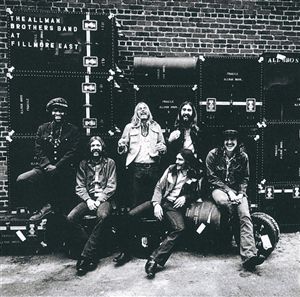
At Fillmore East is the first live album by American rock band the Allman Brothers Band, and their third release overall. Produced by Tom Dowd, the album was released on July 6, 1971, in the United States by Capricorn Records. As the title indicates, the recording took place at the New York City music venue Fillmore East, which was run by concert promoter Bill Graham. It was recorded over the course of three nights in March 1971 and features the band performing extended jam versions of songs such as "Whipping Post", "You Don't Love Me" and "In Memory of Elizabeth Reed". When first commercially released, it was issued as a double LP with just seven songs across four vinyl sides.

Eat a Peach is a 1972 double album by American rock band the Allman Brothers Band, containing a mix of live and studio recordings. Following their artistic and commercial breakthrough with the July 1971 release of the live album At Fillmore East, the Allman Brothers Band got to work on their third studio album. Drug use among the band became an increasing problem, and at least one member underwent rehab for heroin addiction. On October 29, 1971, lead and slide guitarist Duane Allman, group leader and founder, was killed in a motorcycle accident in the band's adopted hometown of Macon, Georgia, making it the final album to feature him.

Gregory LeNoir Allman was an American musician, singer and songwriter. He was known for performing in the Allman Brothers Band. Allman grew up with an interest in rhythm and blues music, and the Allman Brothers Band fused it with rock music, jazz, and country at times. He wrote several of the band's most popular songs, including "Whipping Post", "Melissa", and "Midnight Rider". Allman also had a successful solo career, releasing seven studio albums. He was born and spent much of his childhood in Nashville, Tennessee, before relocating to Daytona Beach, Florida and then Macon, Georgia.

The Allman Brothers Band is the debut studio album by American rock band the Allman Brothers Band. It was released in the United States by Atco Records' subsidiary Capricorn on November 4, 1969, and produced by Adrian Barber. Formed in 1969, the Allman Brothers Band came together following various musical pursuits by each individual member. Guitarist and bandleader Duane Allman moved to Jacksonville, Florida where he led large jam sessions with his new band, one he had envisioned as having two guitarists and two drummers. After rounding out the lineup with the addition of his brother, Gregg Allman, the band moved to Macon, Georgia, where they were to be one of the premiere acts on Capricorn.

Idlewild South is the second studio album by American southern rock band the Allman Brothers Band. Produced by Tom Dowd, the album was released on September 23, 1970 in the United States by Atco Records and Capricorn Records. Following the release of their 1969 debut, the Allman Brothers Band toured the United States extensively to promote the album, which had little commercial success. Their performances, however, did create positive word of mouth exposure that extended to more famous musicians, such as Eric Clapton, who invited group leader Duane Allman to contribute to his 1970 album Layla and Other Assorted Love Songs.

Brothers and Sisters is the fourth studio album by American rock band The Allman Brothers Band. Co-produced by Johnny Sandlin and the band, the album was released in August 1973 in the United States by Capricorn Records. Following the death of group leader Duane Allman in 1971, the Allman Brothers Band released Eat a Peach (1972), a hybrid studio/live album that became their biggest-selling album to date. Afterwards, the group purchased a farm in Juliette, Georgia, to become a "group hangout". However, bassist Berry Oakley was visibly suffering from the death of Duane, excessively drinking and consuming drugs. In November 1972, after nearly a year of severe depression, Oakley was killed in a motorcycle accident, making it the last album on which he played.

Win, Lose or Draw is the fifth studio album and sixth overall by American rock group the Allman Brothers Band. Produced by Johnny Sandlin and the band themselves, it was released on August 22, 1975 in the United States by Capricorn Records. It was the last studio album to feature bassist Lamar Williams and pianist Chuck Leavell.

"Jessica" is an instrumental piece by American rock band the Allman Brothers Band, released in December 1973 as the second single from the group's fourth studio album, Brothers and Sisters (1973). Written by guitarist Dickey Betts, the song is a tribute to gypsy jazz guitarist Django Reinhardt, in that it was designed to be played using only two fingers on the left hand.
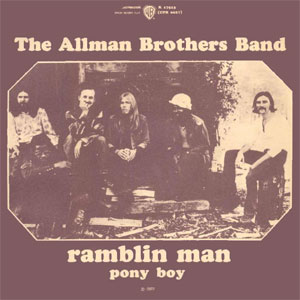
"Ramblin Man" is a song by American rock band The Allman Brothers Band, released in August 1973 as the lead single from the group's fourth studio album, Brothers and Sisters (1973). Written and sung by the band's guitarist, Dickey Betts, it was inspired by a 1951 song of the same name by Hank Williams. It is much more grounded in country music than other Allman Brothers Band compositions, which made the group reluctant to record it. Guitarist Les Dudek provides guitar harmonies, and it was one of bassist Berry Oakley's last contributions to the band.
"Whipping Post" is a song by The Allman Brothers Band. Written by Gregg Allman, the five-minute studio version first appeared on their 1969 debut album The Allman Brothers Band. The song was regularly played live and was the basis for much longer and more intense performances. This was captured in the Allman Brothers' 1971 double live album At Fillmore East, where a 22-minute, 40-second rendition of the song takes up the entire final side. It was this recording that garnered "Whipping Post" spots on both the Rock and Roll Hall of Fame's 500 Songs that Shaped Rock and Roll list and Rolling Stone's list of "The 500 Greatest Songs of All Time", which wrote, "the song is best appreciated in the twenty-three-minute incarnation on At Fillmore East."
"Blue Sky" is a song by the American rock band The Allman Brothers Band from their third studio album, Eat a Peach (1972), released on Capricorn Records. The song was written and sung by guitarist Dickey Betts, who penned it about his girlfriend, Sandy "Bluesky" Wabegijig. The track is also notable as one of guitarist Duane Allman's final recorded performances with the group. The band's two guitarists, Duane Allman and Dickey Betts, alternate playing the song's lead: Allman's solo beginning 1:07 in, Betts joining in a shared melody line at 2:28, followed by Betts's solo at 2:37. The song is notably more country-inspired than many songs in the band's catalogue.
"I'm No Angel" is a rock song written by Tony Colton and Phil Palmer, and first recorded by Bill Medley of The Righteous Brothers on his 1982 solo album Right Here and Now. It gained greater fame when it was covered by American Southern rock band the Gregg Allman Band as the title track and lead single of their 1987 album I'm No Angel, released on Epic Records. The song was an unexpected hit, gaining heavy album-oriented rock airplay and reaching number one on Billboard's Album Rock Tracks chart.

Joe Cocker is the third studio album by Joe Cocker, released in 1972 in Europe as Something to Say on Cube Records, and in the USA as Joe Cocker on A&M Records. It contains the hit single "High Time We Went", that was released in the summer of 1971. Joe Cocker signalled Cocker's change of direction into a more jazzy, blues style. The album reached no. 30 in the US album charts. However, although it received a positive response from the press, it made no impression on the British and European charts.

Laid Back is the debut solo studio album by American singer-songwriter Gregg Allman, released in October 1973 by Capricorn Records. Allman, best known as the vocalist/lyricist/organist of the Allman Brothers Band, first began considering a solo career after internal disagreements with that group. He developed the album as a small creative outlet wherein he would assume full control, and he co-produced the album alongside Johnny Sandlin. Laid Back was largely recorded in March 1973 at Capricorn Sound Studios in Macon, Georgia, with additional recording and mixing taking place at the Record Plant by Manhattan Recording Engineer, Jim Reeves in New York City.
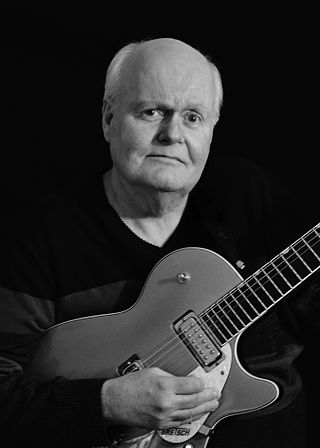
Jesse Willard "Pete" Carr was an American guitarist. Carr contributed to successful recordings by Joan Baez, Luther Ingram, Bob Seger, Paul Simon, Willie Nelson, Joe Cocker, Boz Scaggs, Percy Sledge, The Staple Singers, Rod Stewart, Barbra Streisand, Wilson Pickett, Hank Williams, Jr., and many others, from the 1970s onward.

"Straight from the Heart" is a song by American rock band the Allman Brothers Band, released in July 1981 as the lead single from the group's eighth studio album, Brothers of the Road (1981). Written by guitarist Dickey Betts and Nashville songwriter Johnny Cobb, the song was a conscious effort to produce a hit single. The Allman Brothers Band had signed to Arista Records in 1980, and founder Clive Davis pushed them to modernize their sound. "Straight from the Heart" was later regarded as an "embarrassing" experiment by members of the band.

"Revival", sometimes listed as "Revival (Love Is Everywhere)", is a song by the American rock band the Allman Brothers Band. It was the lead single from their second studio album, Idlewild South (1970), released on Capricorn Records. The song was written by guitarist Dickey Betts, his first songwriting credit for the group.
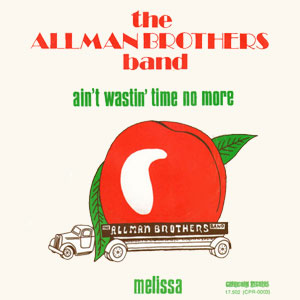
"Ain't Wastin' Time No More" is a song by the American rock band the Allman Brothers Band. It was the lead single from their third studio album, Eat a Peach (1972), released on Capricorn Records. The song, written by Gregg Allman, largely concerns the death of his brother, Duane Allman, who was killed in a motorcycle crash in 1971.
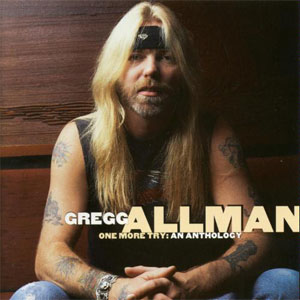
One More Try: An Anthology is a compilation album by American singer-songwriter Gregg Allman, released on September 23, 1997, by Polygram Records and Capricorn Records. The set collects demos, outtakes, and previously unreleased alternate versions of songs by Allman, mainly dating from the period in which he recorded his first solo album, Laid Back (1973).

















